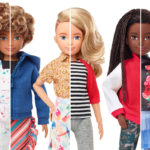
WHY?
Puberty can be tough: big bodily changes, roller-coaster hormonal fluctuations, crushes, peer & social media pressure . . . the list goes on. Kids don’t often get all the support & information they need to navigate this new world safely, confidently & happily. This series gives kids a safer space to receive good info, discuss sensitive topics, ask questions & get honest, accurate, inclusive answers.
Like many other states, NY State does not mandate sex education (only HIV education), which means any sex education given in schools is not required to be comprehensive, medically accurate, unbiased or secular. Even if you already have an open dialogue with your kids about sex — which is fantastic and essential, bravo! — there are still topics and perspectives you may be missing, your child may not feel comfortable discussing everything with you, and there is enormous benefit in community learning, especially regarding topics that don’t often get discussed openly and honestly in public.
WHO IS IT FOR?
Kids in 6th, 7th & 8th grade (if any 6th graders are young and need more time to mature, we recommend waiting until they’re in 7th grade). This is typically an All Genders series, however a Boys cohort and a Girls cohort may be arranged (e.g. for private groups who request it). We usually need at least 5 participants to hold a class; if that threshold is not met, that particular class may be canceled and you will be notified at least 24 hours in advance & reimbursed.
WHAT WILL WE LEARN & DISCUSS?
 |
Healthy Relationships: As kids grow up, it’s important for them to learn about how to have healthy, respectful relationships not only with other people, but with themselves too. Topics covered will include self care, healthy habits, dating, communication skills, and body positivity. |
 |
Bodies & Anatomy: In school, kids often get a very clinical, binary presentation of anatomy, and they may come away confused or worried, with more questions than they got answered. In this workshop, we’ll go into a nuanced review of reproductive anatomy (female, male, intersex) and how all bodies are different. |
 |
Puberty – Ch-Ch-Ch-Changes: Kids don’t often learn about everyone’s experiences of puberty, which can result in secrecy, shame, and an us-vs-them dynamic — not great for empathy (yes, those who will never get a period should still learn about periods!). And pubescent folks have much more in common than they may realize. We’ll review the physical and biological changes, both inside and out, with a focus on commonalities. |
 |
Puberty – Dealing with All the Feels: Let’s take a ride on the puberty rollercoaster, exploring the highs and lows of physical and emotional changes. Continuing from our last class, we’ll offer practical ways to manage puberty’s symptoms and celebrate the process as a rite of passage. |
| Gender Roles & Stereotypes: As humans, we’re predisposed to process a wealth of information by organizing things into distinct categories. But forcing people into boxes can have its drawbacks. We’ll explore assumptions made based on gender and challenge gender stereotypes. The goal is to encourage kids to recognize the vast overlap between all people while celebrating differences. | |
 |
Gender Identity: No matter people’s gender identity, it’s important for them to learn about different experiences and perspectives in order to create a more accepting world. Sex ed materials in schools often assume students are cisgender, and many sex-ed curricula don’t even mention gender identity at all. This not only prevents trans and gender creative students from learning the information and skills they need to stay healthy, but it also contributes to a climate of exclusion in schools and the world in general, where trans and non-binary folks can be targets of bullying and discrimination. This workshop is a start to combat that. |
 |
Orientation & Attraction: We’ll review what all the letters of the rainbow stand for: LGBTQIA+! As with gender identity, sex ed materials in schools often assume students are heterosexual; many sex-ed curricula don’t even mention sexual orientation at all; and some that do discuss it only in a negative light. So we’ll review various orientations. Plus, we’ll also talk attraction, crushes and love! |
 |
What Is Sex?: In our culture, “sex” is often assumed to mean heterosexual intercourse. But the world is much more nuanced than that. In this workshop, we will reframe the concept of sex around egalitarianism, inclusiveness, respect, trust and pleasure, and placing it on a spectrum of risk from low to high. We’ll also debunk the myth of virginity. |
 |
Reproduction: There’s more than one way to make a family. We’ll cover all the ways a sperm can fertilize an egg and people can plan & grow a family. From fertilization through pregnancy all the way to childbirth and beyond, we’ll address the realities of reproduction and parenthood while including all families. |
 |
Safer Sex: We will introduce various methods of STI protection and birth control, including barrier protection (condoms, female condoms, dams), short- and long-term birth control, emergency contraception, and permanent methods. NOT your typical boring health class! |
 |
Consent: Teaching kids respect for their own bodily autonomy as well as others’ can have long-lasting, positive effects on their interpersonal relationships, both romantic/sexual and platonic. We’ll review the many nuances of ongoing enthusiastic consent (how it’s given; how it’s not given; when it can’t be given; when it can be revoked; etc). |
 |
NOT Consent: In this continuation of the class on consent, we will cover everyday examples of consent being given or not; peer and partner pressure; sexual teasing, harassment, assault and abuse; resources for help; and the difference between being a bystander and being an “upstander.” |
 |
Good Communication: Clear talking and active listening is the cornerstone of healthy relationships. We will discuss the difference between passive, aggressive and assertive communication styles; why being assertive is good for boundaries; how to communicate assertively; and the pitfalls of making assumptions. |
 |
Cyber-&-Tech-Smarts: We are living in a new world of internet access, smartphones, tablets, and social media. Studies have shown a strong correlation between the rise of such technological advances and the rise of depression & suicide rates among teens. We’ll discuss issues of tech moderation, etiquette, privacy, texting, sexting, and the laws surrounding it. |
 |
Pop-Culture-Smarts: We’ll discuss how to think critically about the media they consume (tv, movies, books, etc) and the messages media can send. This includes exposure — often inadvertent or nonconsensual — to pornography, a pretty terrible place to learn about real-life, responsible sexuality and relationships. |
 |
Positivity, Responsibility & Justice: We’ll review all we’ve learned in this series, with a focus on how to be a healthy, caring, responsible citizen in the realm of relationships. |
WHEN & WHERE?
This series consists of several workshops (total varies from 8 to 16), with each class lasting from an hour to two hours (depending on the total amount of classes in the series). Current dates, times, and lengths can be found on the Workshops Page. Held either online via Zoom OR in Rhinebeck, New York, OR in your town for private group events. (In-person classes will be held only when it is safe to do so).
HOW MUCH?
Live Online Classes, In-Person classes, and Private Group pricing varies (see Workshops Page for exact pricing).
We strongly encourage signing up for the entire middle school series, so kids can build upon their knowledge and develop a sense of trust with the group, and so you can benefit from the full-series discount! Even if you miss a few classes, signing up for the entire series is still the best deal! Once the series has begun, the remaining classes are prorated as a series to give you the best deal.
For either Online or In-Person classes, anyone who signs up with a friend receives a discount (use the code FRIEND at checkout, making sure to include the name of the friend who is also registering).
We believe everyone deserves access to decent, comprehensive sex education, so we offer a sliding scale option for those who might find full-price a financial hardship — please get in touch to discuss.
